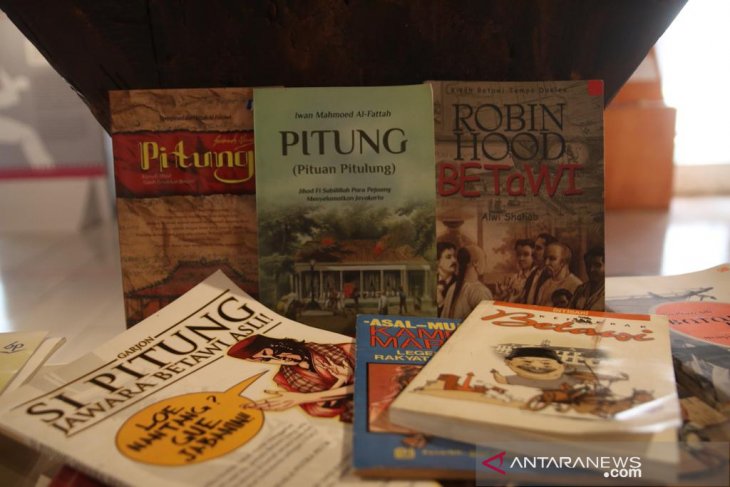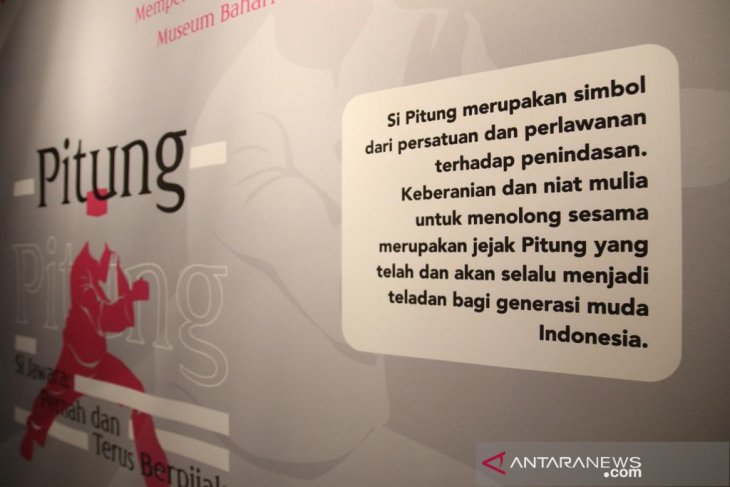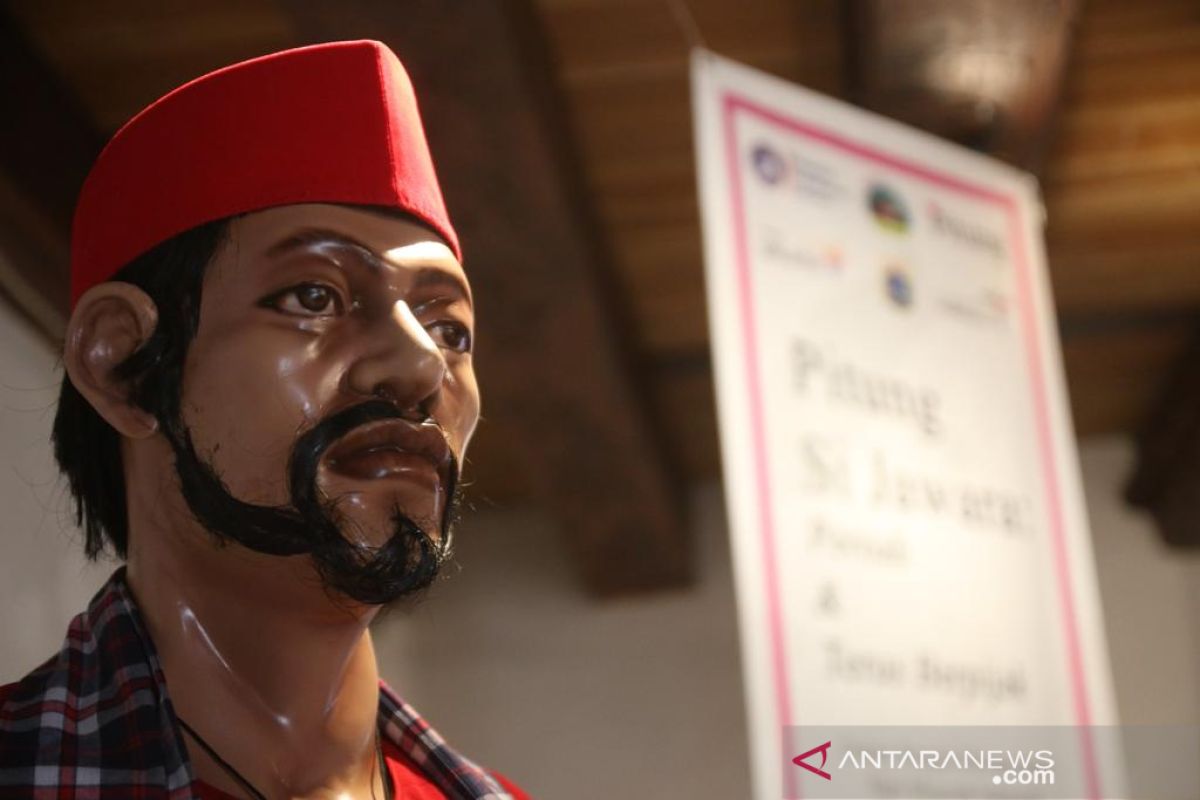The grave of champion Pitung was guarded. Those keeping watch on Pitung’s grave through the night were forbidden to leave until their reliefs had arrived for the night guard. Had told the story that Pitung had come to live again in his grave.Jakarta (ANTARA) - In the mid-19th Century, bordering Batavia, Jakarta’s old city under Dutch colonial government, the powerless, penniless orang Betawi, the autochthonous Jakartans, suffered from food shortages and poverty and enslaved life long to plough wealthy residents' lands.
For decades, orang Betawi endured the misfortunes, but the silence was broken when some criminal gangs sprung out of nowhere and stole from the rich to help the poor.
One of the infamous outlaw was Si Pitung, the most respected figure of orang Betawi, who roamed around Jakarta to rob from the unjust wealthy landowners and residents and later shared the bounties to the have-nots. The story of Si Pitung might bear similarities to the heroic outlaw in English folklore Robin Hood, whose first appearance dated back to the 13th or 14th Century AD, as both figures robbed the rich to help the poor owing to which they were highly admired by the people.
Due to Si Pitung’s huge popularity among orang Betawi, his life story was widely adapted in plays, movies, and tales. Margreet van Till, a Dutch historian, in her academic publication in 1996, stated that the first movie about Si Pitung was produced in 1931. Years later, his story was turned into a series of movies and novels. However, only few scientific-based inquiries of Si Pitung were available to be further studied. Margreet’s works on Si Pitung, which were later published in a journal and book, were among few researches aimed at revealing the figure’s life story and his influences in society. Apart from Margreet, other scholars attracted to Si Pitung include some Indonesian historians, such as Iwan Mahmoed Al Fatah and JJ Rizal.

According to some inquiries from testimonies, newspapers archives, and other official documents, some would agree that the outlaw was not an individual robber, but a group of seven fighters of Pituan Pitulung or in short, Pitung. Far from Si Pitung’s banditry characters, Pituan Pitulung members were depicted as noble, religious, and wise as they received education from pesantren, an Islamic boarding school run by an Ulema, Haji Naipin, in Tanah Abang. Apart from Islamic teachings, Haji Naipin also gave the students a lesson on Pencak Silat martial arts that later came handy for Si Pitung to fight against other criminals and police officers. Out of the seven members of Pituan Pitulung¸the leader, Solihoen, was the most famous figure, and he was later known solely as Si Pitung.
Some robbery cases committed by Si Pitung now were still printed in several newspapers and archives of the Dutch colonial government.
“The first newspaper reports about this person, specifically in the Malay paper Hindia Olanda, can be traced to the summer of 1892,” Margreet wrote in her academic publication in 1996.
According to the papers, Si Pitung was responsible for some major robberies, “one of Nyonya De C., and the other of Hadji Sapiudin, a wealthy Bugis descendant from Marunda,” she added.
As the story goes, Si Pitung robbed the wealthy Hadji Sapiudin owing to his unjust treatments meted out to his workers, who ploughed his lands. He paid a small amount of money to the labors, who had worked overtime. As the people suffered, Si Pitung tricked Hadji Sapiudin by going undercover as a district chief and he accrued Hadji Sapiudin’s money that was distributed to the labors.

At some points in his life, Si Pitung, along with his fellow gang member Dji-ih, were once captured by the police officers in mid-1893, but they managed to escape by “mysterious means from the prison in Meester Cornelis.”
However, an investigation later found out that instead of some supernatural powers, Si Pitung and Dji-ih used a roof gutter to scale the prison’s wall. The adventures continued for a couple of months. Si Pitung and other members of Pituan Pitulung lived in several hideouts, such as the people’s houses and mosques. They also continued to rob the wealthy landowners, who had hoodwinked the workers in order to derive optimal profits.
After years of investigations, raids, and searches, a sheriff or schout succeed to lure Si Pitung into entering the police’s trap. The chief sheriff, Adolf Wilhelm Verbond Hinne, immediately ordered the execution of Betawi’s respected bandit in October 1893. During the raids at a cemetery in Tanah Abang, dozens of sheriffs fired their revolvers at Si Pitung. He missed two bullets, but other shots pierced his chest and back. Si Pitung fell to the ground and died on his way to the hospital.
Si Pitung’s death was sung through a ballad as most people could not read the papers. Mentioned herewith is the English translation of the ballad made by the scholars:
“Si Pitung is dead; and his relatives have been told. His bier was carried from Krekot; he was buried in Penjaringan. I know someone in the hospital who spread the story. That his guts were preserved in spirits. At his funeral, the police provided an escort. The grave of champion Pitung was guarded. Those keeping watch on Pitung’s grave through the night were forbidden to leave until their reliefs had arrived for the night guard. Had told the story that Pitung had come to live again in his grave. The convicts in chains, who had to dig him up, said it was very hard even though picks and shovels had been provided. They had to dig him up because the commissioner was suspicious. Looking into the grave with telescope, they saw that it was still Pitung’s corpse. […] When Pitung died, Mr. Hinne ordered a feast in Tomang, to which hordes of people came, and where all kinds of games were permitted. The feast was permitted for seven days and nights. The aim of the feast was to catch Pitung’s band of men. It was planned to capture Pitung’s band.”
For the colonial authority, Si Pitung was a bandit, who must be executed owing to his crimes. However, history told us that crimes might flourish whenever the ruler failed to serve justice, fairness, and equality to the people.
Despite the “bandit jobs” he endured throughout his life, Si Pitung has epitomized the fight against oppression and unjust colonial government, as well as the greedy landowners. Hence, Si Pitung would always serve as the hero of Betawi’s people.
Related news: Haji Darip from Klender, a forgotten warlord
Related news: Entong Gendut and fight for farmers' cause in early 1900s
Related News: Reviving the legacy of Sabeni, the Betawi fighter
Editor: Gusti Nur Cahya Aryani
Copyright © ANTARA 2019











